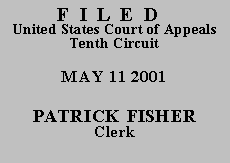

| UNITED STATES OF AMERICA,
Plaintiff-Appellee,
v.
1,100 MACHINE GUN RECEIVERS
INTERPORT OF DELTA, UTAH, Claimant, and WILLIAM YORK, President of Interport, Inc., Claimant-Appellant |
No. 00-4086
(D.C. No. 97-CV-491) (Utah) |
In 1997, the United States filed a complaint under 18 U.S.C. § 545 and 19 U.S.C. § 1595a(c)(2)(B) seeking forfeiture of 1100 machine gun receivers. Interport, Inc. thereafter filed a claim for the receivers, a trial was held in July 1999, and the district court entered an amended judgment and order of forfeiture on October 12, 1999. On December 12, 1999, Mr. York, as agent of Interport, filed a notice of appeal, which was subsequently dismissed by this court for lack of prosecution.
In late December 1999, Mr. York filed a pro se motion under Fed. R. Civ. P. 60(b), in which he argued that the trial testimony of a United States witness was untruthful, the court's findings and conclusions were invalid, the court's order did not address other items seized, and that Interport's counsel was ineffective. The district court denied this motion on January 24, 2000. Mr. York did not file a notice of appeal from the denial of this motion.
On March 2, 2000, Mr. York filed a pleading denominated a motion to reconsider and for findings of fact and conclusions of law under Rule 60(b). In this motion Mr. York again challenged the district court's findings and conclusions, and argued that he was denied due process as a result of his counsel's incompetence. The district court denied this motion on March 14, 2000, on the ground that it made the same arguments contained in his original Rule 60(b) motion. Mr. York filed a notice of appeal from this ruling on May 16, 2000.
We begin by addressing the scope of appellate review. Mr. York did not pursue an appeal of the matters decided in the district court's judgment and order of forfeiture entered October 12, 1999, and instead filed a motion under Rule 60(b) more than ten days after the entry of that judgment. A Rule 60(b) motion does not toll the time for filing an appeal, and an appeal from the denial of a Rule 60(b) motion does not preserve for appellate review the merits of the underlying judgment. See Hawkins v. Evans, 64 F.3d 543, 546 (10th Cir. 1995). Thus Mr. York failed to preserve for appellate consideration the merits of the October 12 ruling.(1)
Moreover, Mr. York did not appeal the denial of his first Rule 60(b) motion, and instead filed a second motion for reconsideration under Rule 60(b) more than ten days after his original motion was denied. This second motion likewise did not toll the time for appealing the denial of his original Rule 60(b) motion, nor does the appeal of the second denial present the propriety of the ruling on his original motion. It is clear that Mr. York has not preserved for appellate consideration either the merits of the original judgment and order of forfeiture or the propriety of the denial of his original Rule 60(b) motion. The only issue properly before us is the district court's denial of Mr. York's second motion on the ground that it raised the same arguments presented in his first motion.
"We review the district court's denial of a Rule 60(b) motion for abuse of discretion." The Servants of the Paraclete v. Does, 204 F.3d 1005, 1009 (10th Cir. 2000). Relief under Rule 60(b) is extraordinary and may be granted only in exceptional circumstances. Id.
[A] motion for reconsideration and a successive Rule 60(b) motion . . . are inappropriate vehicles to reargue an issue previously addressed by the court when the motion merely advances new arguments, or supporting facts which were available at the time of the original motion. Absent extraordinary circumstances, not present here, the basis for the second motion must not have been available at the time the first motion was filed.
Id. at 1012; see also Van Skiver v. United States, 952 F.2d 1241, 1243-44(10th Cir. 1992) (Rule 60(b) motion that advances issues already addressed by district court properly denied).
Here the successive Rule 60(b) motion merely reiterates arguments previously made to and rejected by the district court. Accordingly, the court did not abuse its discretion in denying the motion.
The judgment is AFFIRMED.
ENTERED FOR THE COURT
Stephanie K. Seymour
Circuit Judge
*.After examining appellant's brief and the appellate record, this panel has determined unanimously that oral argument would not materially assist the determination of this appeal. See Fed. R. App. P. 34(a)(2) and 10th Cir. R. 34.1(G). The case is therefore submitted without oral argument. This order and judgment is not binding precedent, except under the doctrines of law of the case, res judicata, or collateral estoppel. The court generally disfavors the citation of orders and judgments; nevertheless, an order and judgment may be cited under the terms and conditions of 10th Cir. R. 36.3.
1. Because the merits of the district court's findings and conclusions are not before us on appeal, Mr. York's motion to strike them is denied for lack of jurisdiction.